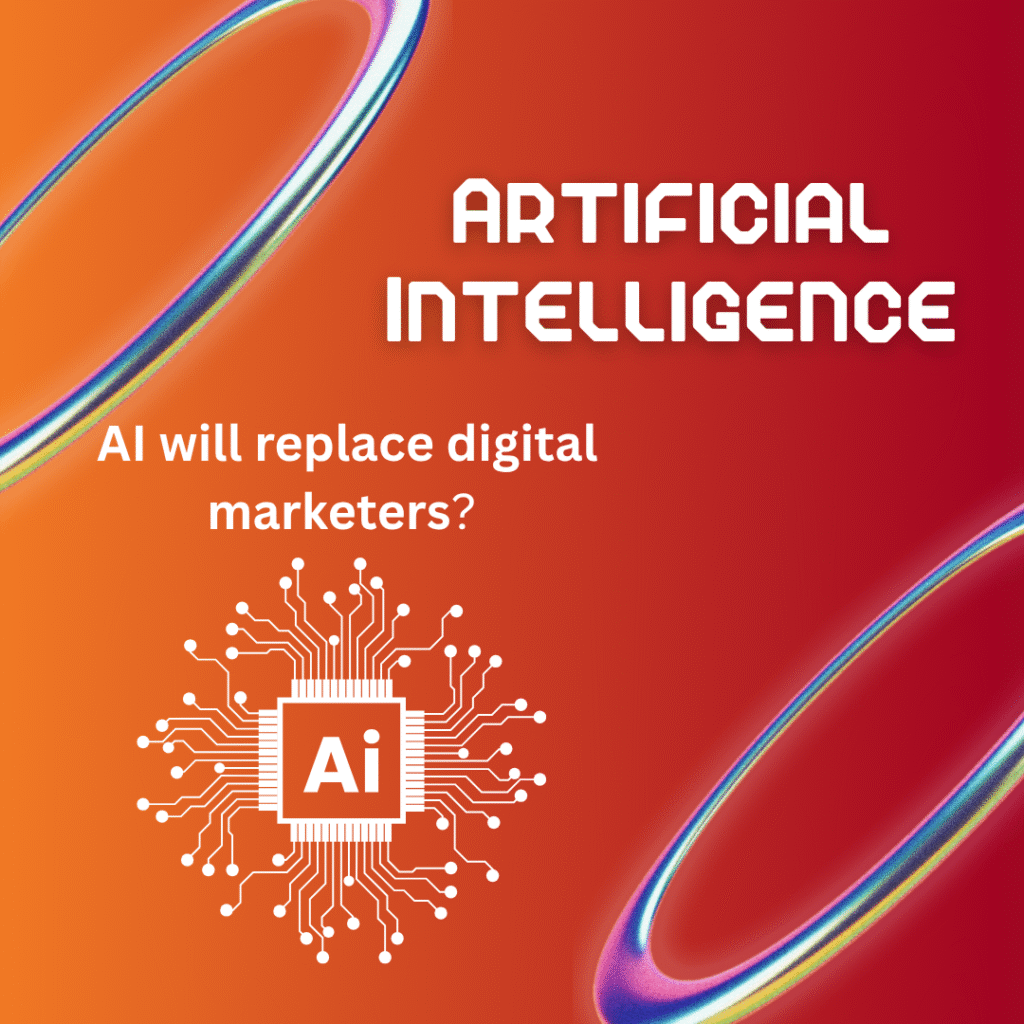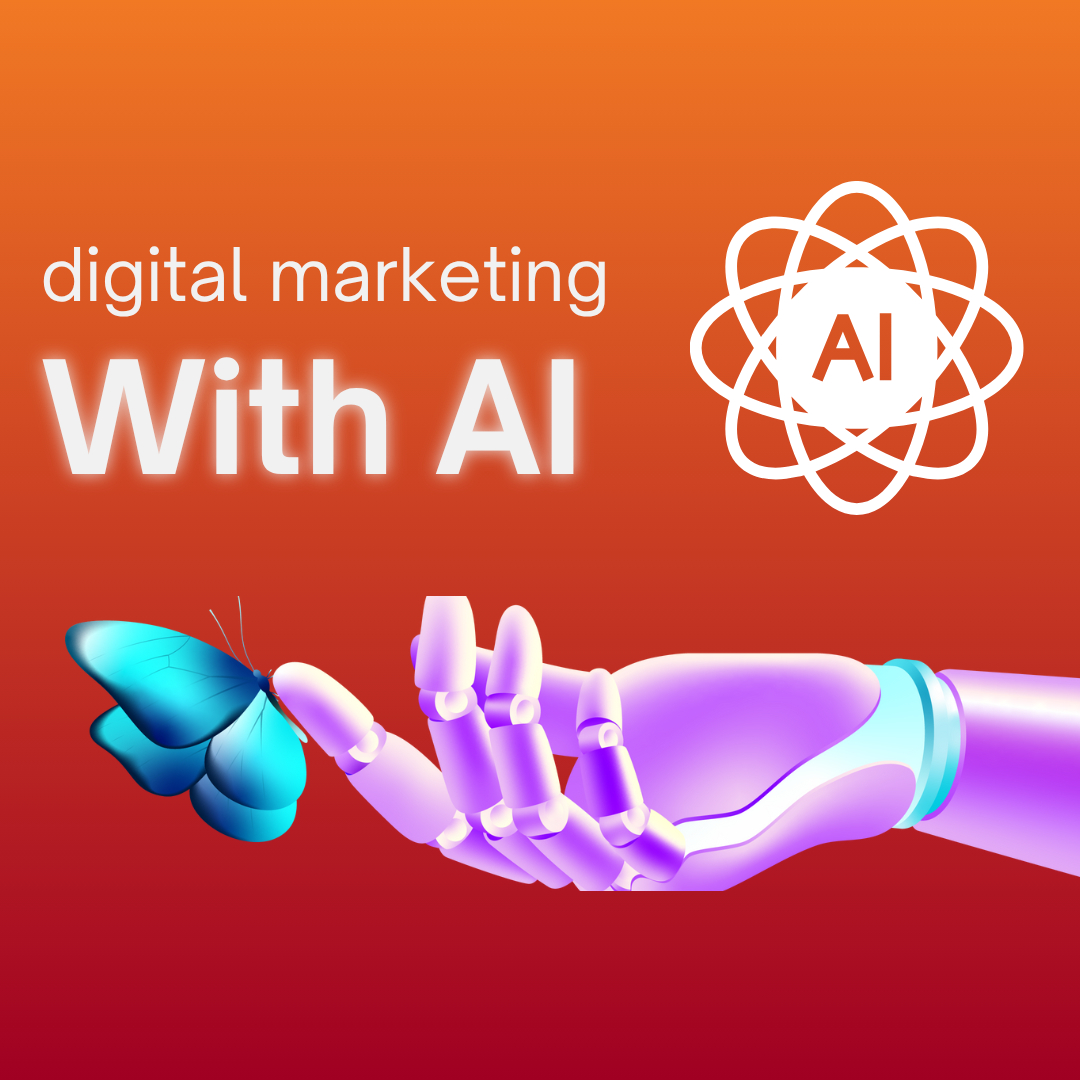The digital marketing landscape is evolving at an unprecedented pace, driven by advancements in artificial intelligence (AI). As businesses increasingly adopt AI for digital marketing, questions arise about the role of human marketers in this new era. Will AI replace digital marketers entirely, or will it serve as a powerful tool to enhance their capabilities? This blog explores the impact of AI on digital marketing, its potential to transform the industry, and whether it poses a threat to the profession.

The Rise of AI in Digital Marketing
AI for digital marketing is revolutionizing how brands connect with their audiences. From predictive analytics to personalized content creation, AI technologies are streamlining processes that once required extensive human effort. Tools powered by AI can analyze vast amounts of data, identify consumer behavior patterns, and deliver tailored marketing campaigns with remarkable precision. For instance, AI-driven platforms like Google Ads and HubSpot use machine learning to optimize ad placements, ensuring maximum return on investment (ROI).
The integration of AI for digital marketing extends beyond advertising. Chatbots, powered by natural language processing (NLP), provide instant customer support, improving user experience and freeing up marketers to focus on strategy. Content generation tools, such as Jasper and Copy.ai, use AI to create blog posts, social media captions, and email campaigns in seconds. These advancements highlight AI’s ability to handle repetitive tasks, allowing marketers to prioritize creativity and innovation.
Can AI Replace Digital Marketers?

The question of whether AI will replace digital marketers is complex. On one hand, AI for digital marketing excels at automating routine tasks. Data analysis, A/B testing, and campaign optimization can now be performed faster and more accurately by AI algorithms than by humans. For example, AI tools can process millions of data points to predict which ad copy will resonate with a specific demographic, reducing the guesswork involved in traditional marketing.
However, digital marketing is not just about data and automation—it’s about understanding human emotions, cultural nuances, and storytelling. These are areas where human marketers still hold an edge. While AI can generate content, it often lacks the emotional depth and originality that a skilled marketer brings to the table. Crafting a brand narrative that resonates with an audience requires empathy, creativity, and a deep understanding of human psychology—qualities that AI has yet to fully replicate.
Moreover, strategic decision-making remains a human domain. AI for digital marketing can provide insights and recommendations, but it’s up to marketers to interpret these insights and align them with broader business goals. For instance, an AI tool might suggest targeting a specific audience segment based on data, but a human marketer decides whether that aligns with the brand’s values and long-term vision.
The Benefits of AI for Digital Marketers
Rather than replacing digital marketers, AI is more likely to empower them. The adoption of AI for digital marketing offers several benefits that enhance efficiency and effectiveness:
- Enhanced Data Analysis: AI processes large datasets in real time, providing actionable insights into consumer behavior. Marketers can use these insights to refine campaigns and target audiences more effectively.
- Personalization at Scale: AI enables hyper-personalized marketing by analyzing user preferences and behaviors. For example, Netflix uses AI to recommend content tailored to individual viewers, a strategy that marketers can replicate to deliver personalized ads or emails.
- Automation of Repetitive Tasks: Tasks like scheduling social media posts, generating reports, or optimizing ad budgets can be automated with AI, freeing marketers to focus on creative and strategic work.
- Improved Customer Experience: AI-powered chatbots and virtual assistants provide 24/7 customer support, ensuring seamless interactions and higher satisfaction rates.
- Cost Efficiency: By automating time-consuming tasks, AI reduces the need for large teams, allowing businesses to allocate resources more effectively.
These benefits demonstrate that AI for digital marketing is a tool that complements human expertise rather than replaces it. Marketers who embrace AI can work smarter, leveraging its capabilities to achieve better results.
Challenges and Limitations of AI in Digital Marketing
Despite its advantages, AI for digital marketing has limitations. One major challenge is the risk of over-reliance on automation. AI-generated content can sometimes feel generic or fail to capture a brand’s unique voice. For example, while AI can produce a blog post, it may not reflect the tone or style that resonates with a specific audience. Human oversight is essential to ensure authenticity and alignment with brand identity.
Ethical concerns also arise with AI in digital marketing. Data privacy regulations, such as GDPR and CCPA, impose strict guidelines on how consumer data can be used. Marketers must ensure that AI tools comply with these regulations to avoid legal repercussions. Additionally, excessive personalization can sometimes feel intrusive to consumers, leading to backlash if not handled carefully.
Another limitation is the learning curve associated with AI tools. While many platforms are user-friendly, mastering advanced AI systems requires time and training. Small businesses or marketers with limited technical expertise may struggle to fully utilize AI’s potential.
The Future of Digital Marketing in the AI Era
The future of digital marketing lies in a symbiotic relationship between AI and human marketers. As AI technology advances, it will likely take on more complex tasks, such as predictive modeling and real-time campaign adjustments. However, human creativity, emotional intelligence, and strategic thinking will remain critical to crafting campaigns that resonate on a deeper level.
To thrive in this AI-driven era, digital marketers must adapt by upskilling and embracing AI tools. Learning to leverage AI for digital marketing can help marketers stay competitive in a rapidly changing industry. For example, understanding how to interpret AI-generated insights or fine-tune AI content to align with brand messaging will become essential skills.
Collaboration between AI and marketers will also lead to new opportunities. AI can generate data-driven ideas, while marketers can refine those ideas into compelling campaigns. For instance, an AI tool might identify a trending topic on social media, but a marketer can turn that insight into a viral campaign by adding a creative spin.
How Marketers Can Prepare for the AI Era
To remain relevant, digital marketers should take proactive steps to integrate AI into their workflows:
- Invest in Learning: Familiarize yourself with AI tools like Google Analytics, Salesforce, or Hootsuite Insights. Online courses and certifications can help bridge the knowledge gap.
- Focus on Creativity: Hone skills that AI cannot replicate, such as storytelling, brand strategy, and creative problem-solving.
- Stay Updated on Trends: The AI landscape evolves rapidly. Follow industry blogs and attend webinars to stay informed about new tools and techniques.
- Embrace Collaboration: View AI as a partner, not a competitor. Use it to handle repetitive tasks while you focus on high-level strategy.
- Prioritize Ethics: Ensure that AI practices comply with data privacy laws and maintain transparency with consumers.
By adopting these strategies, marketers can harness the power of AI for digital marketing while maintaining their unique value in the industry.
Conclusion
Will AI replace digital marketers? The answer is likely no. While AI for digital marketing is transforming the industry by automating tasks and providing data-driven insights, human marketers remain essential for creativity, strategy, and emotional connection. The future of digital marketing lies in collaboration between AI and humans, where each complements the other’s strengths. By embracing AI tools and continuously upskilling, digital marketers can thrive in this new era, delivering innovative campaigns that drive results. The key is to view AI not as a threat but as an opportunity to elevate the art and science of digital marketing.



